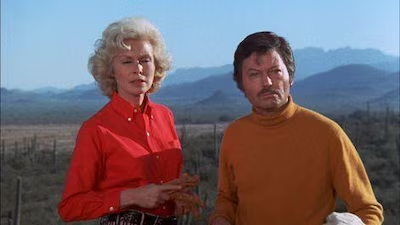A. C. Lyles
About
Biography
Biography
A legendary figure in the history of Hollywood moviemaking, if a largely unknown one to the general public, producer A.C. Lyles spent over eight decades as an employee at Paramount Studios, where he oversaw a string of extremely profitable low-budget Western features in the mid- to late-1960s. Lyles became entranced with motion pictures as a boy, and worked his way into a job at Paramount through a series of letters to Paramount chief Adolph Zukor. He moved up the studio ladder to producer in the late 1950s, overseeing minor genre films like "Short Cut to Hell" (1956), a noir directed by James Cagney. In the 1960s, he began working on Westerns, which he populated with former A-list stars whose careers had stalled due to age or unfortunate circumstance. His features never lost a dollar due to their modest budgets, and his track record eventually carried him to the White House, where he served as a conduit for Presidents Ronald Reagan and George H.W. Bush and the Hollywood elite. As Lyles entered his ninth decade, he settled comfortably into his role as living show business history lesson, regaling visitors to his office on the lot with tales of Hollywood luminaries from days gone by. A.C. Lyles' extraordinary career and longevity made him an icon in a business not known for its respect for older, experienced talent.
Born Andrew Craddock Lyles, Jr. on May 17, 1918 in Jacksonville, FL, his love affair with the movies began on his 10th birthday when he saw "Wings" (1928), Paramount Pictures' Oscar-winning World War I epic. Lyles became possessed by the idea of making motion pictures through Paramount, and soon took a job sweeping floors and giving out handbills at a local theater that was owned by the studio. He also began a letter writing campaign to Paramount head Adolph Zukor, who met with Lyles on a business trip to Florida and suggested that the young man keep in touch with him. Shortly after graduating high school, Lyles was sent to Hollywood on assignment from a Jacksonville newspaper to interview Shirley Temple, who was then under contract to 20th Century Fox. Though he was granted an interview with Fox head Darryl F. Zanuck, Lyles went to Paramount and landed a job in its mailroom department.
The ambitious Lyles soon worked his way up to Paramount's publicity department, while learning the intricacies of filmmaking and studio politics from Zukor. In 1956, Lyles took his first steps towards producing with "The Mountain," a Spencer Tracy drama on which he served as assistant to Edward Dmytryk, the film's director and producer. The following year, he stepped out on his own with "Short Cut to Hell" (1957), a low-budget remake of "This Gun for Hire" (1942) directed by his friend, actor James Cagney. He next forayed into television, serving as associate producer on nine episodes of "Rawhide" (CBS, 1959-1965), which began his long association with Westerns.
Lyles returned to features with the boyhood drama "Raymie" (1960), starring Alan Ladd's son, David, which was followed by "The Young and the Brave" (1963), a Korean War actioner with a trio of former leading men - Richard Arlen, William Bendix and Rory Calhoun - in the lead roles. The film established Lyles' shrewd, cost-effective strategy of peopling his features with actors whose careers were on the wane, but whose previous career accomplishments lent a degree of star power to his low-budget productions. Between 1964 and 1968, he turned out a steady stream of B-Westerns studded with familiar faces, including Bendix, Arlen and Calhoun, as well as Dana Andrews, Jane Russell, Howard Keel, Broderick Crawford and John Agar - all stars whose luminescence had dimmed due to age or drink. Their presence helped to make these modest horse operas profitable during their brief theatrical runs, and the films later became staples of late-night television broadcasts.
Lyles stumbled with his 1972 feature, "Night of the Lepus," an absurd ecological horror film about colossal mutant rabbits on a rampage. He quickly moved into television, producing several made-for-TV features as well as the family series "Here's Boomer" (NBC, 1980-82), about a resourceful stray dog. The program would be his last credit as a producer for the better part of the next two decades. In 1983, Lyles was appointed by then-President and old friend Ronald Reagan to the Advisory Council on Private Sector Initiatives, which focused on social service programs. He also served as the White House's unofficial liaison to Hollywood, bringing celebrities to entertain both Reagan and his successor, George H.W. Bush. In 1984, Lyles received the George Washington Award of the Freedoms Foundation, which was awarded to individuals who promoted understanding of the American way of life and the country's heritage.
During this period, Lyles retained his office at Paramount, though by the new millennium, he was largely a living conduit to the Golden Age of Hollywood than an actual producer. In 1988, he was awarded a star on the Hollywood Walk of Fame, the same year that Paramount named a building on the lot in honor of his eight decades of service to the studio. He surprised many by serving as consulting producer on "Deadwood" (HBO, 2004-06), producer David Milch's proudly profane Western series for cable. The series was a joint production of HBO and Paramount, and Milch called Lyles in the early stages of production to lend his expertise with the genre to the show.
By Paul Gaita
Filmography
Cast (Feature Film)
Writer (Feature Film)
Producer (Feature Film)
Film Production - Main (Feature Film)
Production Companies (Feature Film)
Cast (Special)
Writer (Special)
Producer (Special)
Special Thanks (Special)
Misc. Crew (Special)
Life Events
Videos
Movie Clip





Trailer













